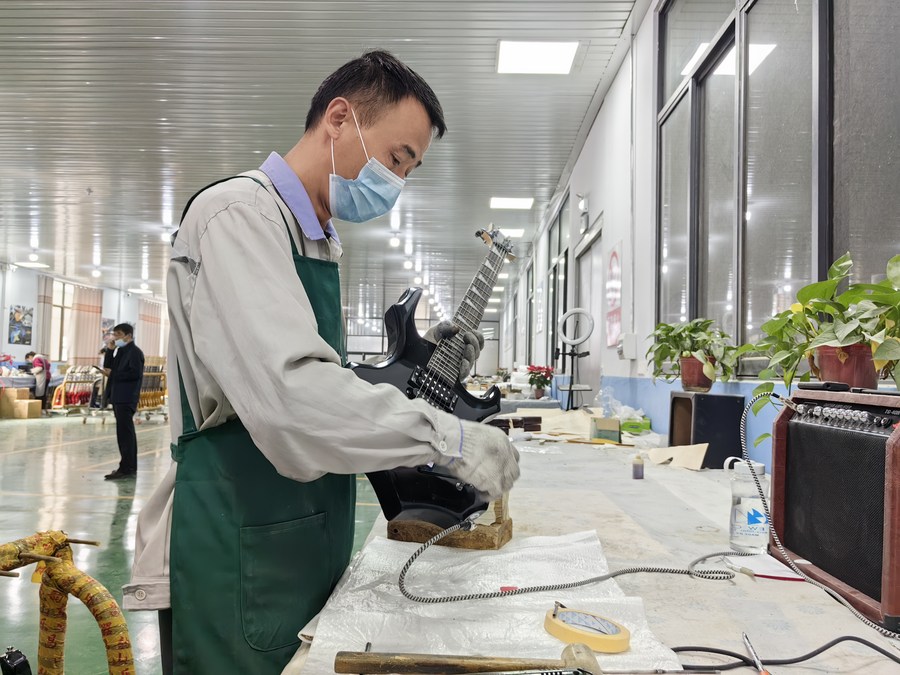
Li Qingsheng tunes a guitar in Tangwu, a small town in east China's Shandong Province, Oct. 21, 2022. (Xinhua/Chen Guofeng)
JINAN, May 18 (Xinhua) -- After working in the guitar industry for more than a decade, Li Qingsheng, a former farmer, has honed the skill to distinguish the desired timbre and tune more than 300 electric guitars a day.
Li works at the Changyunda musical instrument company in Tangwu, a small town in east China's Shandong Province which has been the manufacturing hub of musical instruments, especially guitars, for decades. At present, about 2 million musical instruments are produced in the town every year, with an annual output value of 1 billion yuan (about 142.92 million U.S. dollars).
According to Zhang Longgang, general manager of the Changyunda musical instrument company, the process of guitar making involves seven crucial stages that include molding, sanding, painting and drying. He explained that each process consists of around 10 to 20 steps, of which 80 percent need to be done manually, and therefore, the core competitiveness of the industry lies in craftsmanship.
More than 8,000 people are involved in the entire production chain of the guitar industry in Tangwu, accounting for over 10 percent of the town's population, with some workers earning a monthly income of nearly 10,000 yuan.
Previously, guitar factories in Tangwu were mostly small and the production standard of the guitars was not clear. The young generation of industry leaders, such as Zhang, continued to refine the production process and quality standards in order to gain market recognition.
After 11 years of development, Zhang's factory has the advantages of scale and standardization. The number of workers has increased from the initial 10 to more than 80, while the annual output of its musical instruments such as electric guitars and bass guitars exceeds 100,000, which are exported overseas.
In Tangwu, the number of musical instrument production and accessories processing enterprises has grown to more than 80. The products cover nearly 400 varieties under eight series, such as electric guitars, acoustic guitars, ukuleles, banjos and mandolins, which are exported to more than 30 countries and regions including the Republic of Korea, Japan and the United States.
According to Meng Hong, the Party chief of Tangwu Town, to ensure the high-quality development of local musical instrument companies, the government actively organizes them to participate in international exhibitions and has increased investment in innovation, promoting the transformation of the musical instrument industry from OEM production to independent research and development.
"We have to build our own brands," said Zhao Weiguo, general manager of Eart Music Co., Ltd.
In over a decade, the company forged cooperations with the Sichuan Conservatory of Music, Tianjin Conservatory of Music and other universities to establish its own art college, and developed more than 500 "guitar classrooms" across the country to train guitar teachers and students. It also held music festivals and summits to expand its brand influence. As a result, a number of national-level performers as well as guitarists from well-known bands have been included in the customer list of Eart Music Co., Ltd.
Thanks to years of efforts, Tangwu has cultivated nearly 40 local brands such as Krait and Eart. Liu Di, who had been engaged in arranging and recording in Beijing, is optimistic about the development prospect of Tangwu's musical instrument industry and set up the Disheng musical instrument company there a few years ago.
Through cross-border e-commerce sites, Liu sells more than 6,000 electric guitars a month abroad. "I want guitarists all over the world to know Tangwu," he said.
"In the near future, we will promote 'Tangwu guitar' as a regional brand, and combine the development model of industry, culture and tourism to make Tangwu a guitar town with international influence," Meng said.




 A single purchase
A single purchase









